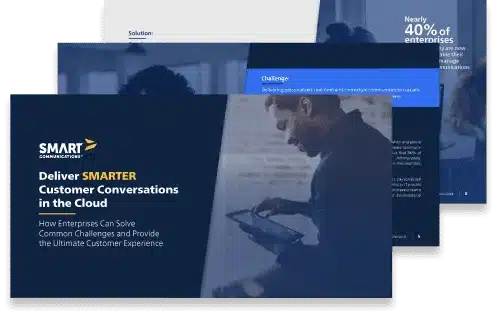Having SMARTER Customer Conversations Requires Forms Transformation
By James Brown, CEO of Smart Communications
It was less than one year ago that we announced we had acquired Intelledox. We knew at that time that this decision would allow us to empower our customers to deliver the smartest, most interactive communications possible, throughout the entire customer lifecycle—from acquisition to servicing, and every interaction in between. Today, we are making that vision a reality for companies that want to bring to their customers a customer-centric, digital-first experience that is truly rewarding. To do this most effectively required a deepening of the integration between the forms transformation capabilities that Intelledox was already delivering to the market and the next-generation customer communications management capabilities made possible by SmartCOMM.
The result? Intelledox is now SmartIQ, a key component of our customer conversations management platform. The timing of this important shift is critical. To be successful today organizations must become more digital-first and engage their customers in dynamic conversations. To achieve this, they must first more effectively collect customer information and then use that information to respond appropriately, quickly and via preferred channels. If interactions are still paper-based and static, enterprises risk creating a significant gap between what customers expect and what is being delivered. This starts from the very beginning of the customer relationship and remains critical throughout every stage of the lifecycle.
To evaluate the experience they are delivering, companies need to ask themselves a few very important questions:
- Are all of your forms online (and preferably mobile-friendly), or are you still requiring paper or scanned PDFs you then have to extract?
- Can you be sure customers are using the most recent version of the form?
- Are the fields pre-populated with what you already know, so the individual only needs to confirm data rather than rekey it in?
- Do you know your NIGO (Not In Good Order) rates of incomplete or inaccurate submissions?
- Are you asking only relevant questions? (For example, do you ask single customers to enter information about their spouse? Do you ask people in different states or countries the same compliance questions?)
- How much time does it take your internal IT team to launch new forms or make changes to existing ones?
- Do you allow for users to start in one device and finish on another, even allowing that to take place offline?
- What happens when you receive a returned form?
- Is manual work required to rekey information introducing the risk of human error and taking time away from valuable employees?
- What’s the risk you’re creating if you are not building an interactive, digital conversation with your customers today?
Your answers to these questions might reveal that your processes are tedious, time consuming, outdated and not customer-centric. Today’s consumers prefer instant gratification.
How do you deliver that? We would propose that the form of the future isn’t really a form at all.
Forms transformation needs to be a top priority as companies focus on digital transformation. Companies must embrace the concept of adaptive interviews, that turn forms into intuitive, guided journeys that are contextually aware based on the customer’s personal preference, device and location. In an adaptive interview, you ask intelligent questions based on known data and new responses. This eliminates unnecessary fields and the need to enter and re-enter information into a static form. Ideally, customers should be able to easily submit information, track their progress and quickly pick up where they left off. Furthermore, companies must also understand that at some point in the process the customer will likely be using a mobile device and the experience must reflect that and be able to adapt accordingly. Now is the time to transform processes and shift to more adaptive interview-like processes. This improves customer experience and speeds up the business process.
So much has happened in the last year. Not just for our company, but for the entire world. At a time when delivering digital-first customer interactions is more important than ever, cloud-based technologies, like SmartIQ, allow companies to be agile and empowered to respond to rapid change while also keeping their customer relationships front and center. When companies recognize the need to digitally transform in order to meet or exceed customer expectations, the benefits to the customer are tremendous and so too is the impact on the bottom line. We are thrilled to be able to enable our customers to achieve all of this and more. Let us know if we can tell you more about how we do that.



